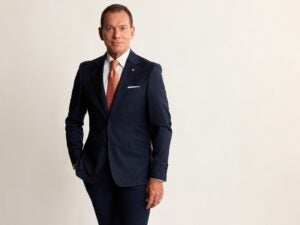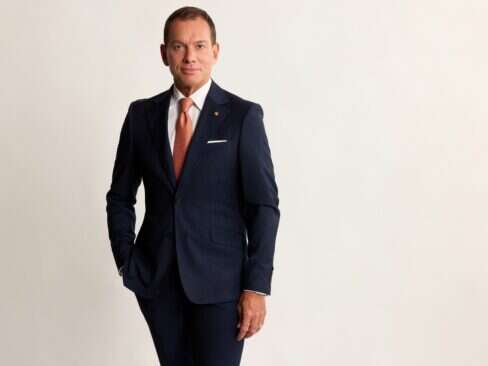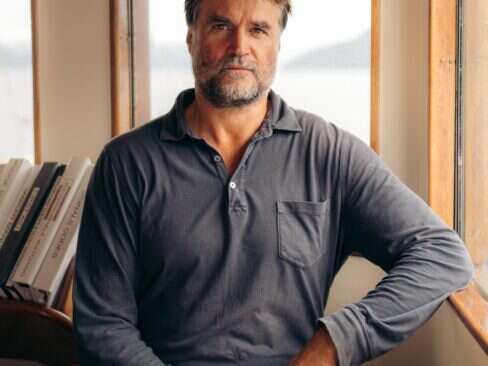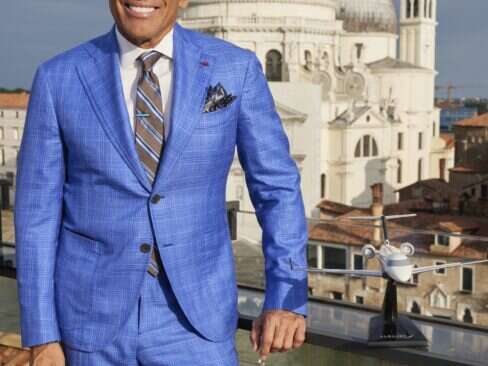
FounderDomenico Vacca
Italian fashion designer and businessman Domenico Vacca’s namesake boutiques will never be filled with fashion-forward silhouettes, or a sea of black fabric for an entire season. Instead, Vacca has built his fast-growing tailored clothing empire on a concept that Italians have known for decades: classic, well-made clothes create a wardrobe that lasts a lifetime. Even in this era of fast fashion, discriminating clients like Ronald Lauder, Edgar Bronfman Jr., Pepe Fanjul and Kanye West, are agreeing and becoming his loyal clients. Elite Traveler Editorial Director Laura Hughes caught up with Vacca this spring in his NYC showroom. Surrounded by cashmere jackets, alligator bags and hand-tailored suits, Vacca talked about his history in the business, how the fashion industry can survive this recession, and why great clothes are as collection-worthy as fine art.
ET: How did your family influence your career path?
Domenico Vacca: My grandmother, in the 1950s, already had a fashion company in the south of Italy, near Bari. She employed 50 seamstresses. So I grew up touching fabrics, playing with scissors, and climbing onto tailor tables. It was a lot of fun for a kid. That was before the global expansion of fashion, before the same clothes were sold in London as in Tokyo. Coming from there, I went first to law school and practiced international law for ten years, both in Milan and in New York. Then I got my Master’s degree from New York University. My father was a dean at the university in Bari, and he was a very well-dressed man. He really represented the culture of the south of Italy. We told a story there, of three guys who meet up. Two have jobs, and the third—when asked what he does—simply says, “I dress.” You have to look better! It was a great culture of getting dressed. My father was such an inspiration. I never saw him without a jacket, even at home. He would wear a shirt, tie, jacket, and robe on top of it all.
ET: How did you learn the business of fashion?
Domenico Vacca: When I worked at the law firm in New York, I represented 90 percent of all Italian fashion companies doing business in the United States. From the Italian Trade Commission to Marzotto. So I understood the business role of fashion—opening stores, operating showrooms, licenses, developing a brand. Also, while practicing law, I started a magazine, which was a glossy publication about “Made in Italy.” The concept is educating Americans to buy products that are made in Italy, as opposed to China, for example. It has articles and interviews, from food to fashion to jewelry, and showcased leaders who explained how why the things they were doing at the very high end were worth buying. It was called “Italia,” and had a circulation of 200,000. Through it, I had the opportunity to visit every company in Italy and acquired huge knowledge of how products were made. So, I had the family background, the heritage of fashion, exposure to the U.S. market, and knowledge of how to communicate luxury. When I left the law firm, it was time to go and do what I liked to do.
ET: What were the steps involved in creating such a beautifully made clothing collection, with international distribution, from scratch?
Domenico Vacca: I looked at factories in Naples, because quality at the end of the day won’t be out of fashion. The new black isn’t another color, but luxury. I sold the publication after four years, which was also after September 11. And I opened the first Domenico Vacca store in the spring of 2002 on Fifth Avenue in New York. At that time, the U.S. market had both purchasing power and a willingness to be educated. Italians had no money, and everyone already knew how to dress. So within six months of September 11, peoples’ behavior was back to normal, and they were traveling to Italy and realizing they wanted to dress like Italians. My role became to explain real luxury, because there has been a lot of fake luxury around.
ET: And the growth of your store network has been rapid?
Domenico Vacca: Then we opened another six stores in the U.S., plus Moscow, Qatar opens next week, September sees the opening of Seoul, then Beijing, Tokyo, Hong Kong and Macao. The stores will bring high end hand-made clothes, accessories and custom tailoring around the world. The idea is that clients can buy handmade clothing off the rack, and then have the option of doing bespoke clothing too from more than 5,000 different fabrics we carry in our stores. And, the clothing is the same price as other companies’ machine-made collections.
ET: Does the Dominico Vacca client care if his suits are made by hand or by machine?
Domenico Vacca: We explained to them from the start why hand-made is better than machine-made. For an analytical client like an American, one would think that machine-made would be perfect. So we explain, and focus on that.
ET: How has business been as the economy turned?
Domenico Vacca: 2008 was our best year ever. The first quarter of 2009 was down by 10 percent, which is definitely because of the recession. In the U.S., people spend today and say they will work out tomorrow how to pay their credit cards. That is wonderful, until you lose your job, or have your credit limit lowered, and then the entire country stops. How do we convince people that they are fine spending, especially since their spending will save other peoples’ jobs? If you think that the stimulus package only went into the banks, that’s not stimulating anything. There is a depression now, so they should be reassured to spend less, but still spend. No one is delivering that message yet. Also, each company has to evaluate whether they are doing the right things. When Madison Avenue store rents were $1,500 a square foot, that was a problem. Companies had a growing overhead and expenses, so they increased the price of products. So now, companies are doing 50 percent less in sales, and are going to go bankrupt. There is just no way they can maintain their same business structure if they are doing 50 percent less. If a company is down 10 percent, that is okay, and due to the recession. But the other 40 percent is due to mistakes that have been made by so many companies over the last ten years. I’m not surprised that department stores are in that position now; their selection of merchandise doesn’t make sense. I was just in Barney’s and saw the worst cut women’s dresses in the cheapest materials. They were machine-made, and cost $3,500. Who is going to buy it? I understand that Barney’s is committed to bringing new designers in, but clients here know value now. When you sell a machine-made suit for $5,000 because a designer’s name is on it, people aren’t going to buy it now. Those who are doing real quality for value will do well.
ET: What is the pricing of a Domenico Vacca suit?
Domenico Vacca: Men’s suits range from $4,600 to $5,600 off the rack. Women’s suits range from $3,900 to $4,900. We are dealing with more sophisticated clients now. They don’t want big labels, even clients in Russia. This client says, “OK. I know what to look for, and if I find that I don’t mind spending to develop my wardrobe.”
ET: It sounds like you see a new definition of luxury emerging?
Domenico Vacca: All the major luxury goods companies already sold a lot of handbags to the very wealthy, so then they went to the level below. This level is the aspirational client who saves for a long time to finally buy one Cartier watch. These people aren’t here anymore. Now, the very rich don’t want to go around with the same handbag that everyone else has. So they are coming to us for the alligator bag that is not recognizable. All of the people who shopped for status have disappeared. And so many companies overextended themselves to reach the aspirational client. There are fantastic luxury branded stores in the middle of mass market malls now where no one is shopping. So now those brands have to convince the affluent that their product is still hot and exclusive? Their options are to either sell a cheaper line, or go high end only.
Now the market is telling us there is real luxury, and the so-called luxury of two years ago. This is a complete readjustment. Department stores aren’t considering what brands will still be strong tomorrow, or anything more than two seasons. Department store buyers should ask brands, “What will you be doing in five seasons?” Otherwise they just confuse the consumer and are not building a clientele. Today a client will buy a classic blue suit and know they can wear it for a few seasons. They won’t know that if they buy a short jacket and short pants.
ET: What will it take to succeed as a retailer going forward?
Domenico Vacca: People need value, quality, amazing customer service, and someone to teach them how to develop their wardrobe with pieces they can wear over again. The people who said you should throw out and buy new and not the people that customers will go to now. In April we saw normal sales in our stores. It’s not an insane amount of money, but customers are still spending. It’s great when an educated customer comes into the store. We cater to 60 percent men, and 40 percent women.
Men are receptive to sartorial clothes and will add pieces to develop a wardrobe that they can pass on to a son. Both men and women we work with are collectors—of art, watches and houses—and now our clothes since they will last ten years. It’s funny because ten years ago I went to a client’s house, opened the closet and it looked like junk with thin hangars and squashed clothes. Then closets became walk-in closets. Now they are dressing rooms, with clothes arranged by color and all hanging on the perfect hangar. We are talking about the wealthy. It is the same level of care you would see in someone’s wine cellar, where bottles are arranged by year or vineyard, or with a humidor or a watch collection. Clothes finally got to the point where they have become collections. Our clients keep buying pieces, like a cotton suit, then a linen jacket, and shoes and belts. Women are doing the same. My mission is, I want women to open their closet and say, “Oh my God, I have so much to wear!” They should never have that I-have-nothing-to-wear crisis. Just buy a few pieces each season, and don’t throw out.
Client should develop their own identity, not the identity of a fashion designer. Three months ago you are allowed to wear high waistbands, but now only low? I don’t understand. Italian women have their own personalities. You cannot say to them, “This season is mini-skirts.” Forget it. Instead, buy another skirt in an interesting fabric that works with the blouse you already have. When you buy a new piece of art, you don’t throw out the furniture and other art! It’s the same with clothes. These are assets.
ET: Many Hollywood stars wear Domenico Vacca in their films, or on the red carpet. How do those relationships start?
Domenico Vacca: This is still very important, because no other medium is as global as film. Last week I dressed Mickey Rourke for his new movie premiere. The next day, his image was in every media outlet in the world. He wore such a recognizable shirt and jacket, and I got so many calls from clients. Also, in Russia, he was on television for a whole week. That makes the Domenico Vacca name go around and gives exposure you can’t buy. When twelve people on the red carpet say, “I’m wearing Domenico Vacca,” its incredible. I didn’t sponsor celebrities, I just wardrobed 25 movies, so the actors got to appreciate the clothes and then they came to us. Forest Whitaker spent $125,000 in a year on his own clothes. Now actors are putting into their contracts that they will keep the clothes at the end of filming. Directors also understand that great clothes help characters express themselves. We have so many ambassadors going around now. To have this kind of exposure is great, especially in this time, as long as they are names that clients like. It spreads the gospel.
ET: Will you ever return to your roots and open a store in Italy?
Domenico Vacca: I am looking at Milan. But landlords there are still asking a lot of lease money. In this economy, that is difficult to justify. There they have “key money,” which also happens in London. At the end of the day, there is no agreement. Big companies there don’t want anyone else to get into that market. So Montenapoleone and Via Della Spiga feel like only department store brands. That means Milan doesn’t make sense for sales, but it’s a good presence to have. Milan used to be a center of global fashion, but the world is changing. Some of the best performing stores are in Korea. The world of fashion is now based on markets that perform most. Ten years ago it was Russia, now it is no longer. And 20 years ago all eyes were on Japan. Brands are becoming so international, through global markets and the Internet. We get 3,000 hits per day on our web site from people in all countries.
ET: Are you optimistic about the future of luxury fashion?
Domenico Vacca: This is fashion, not distributing water. At the end of the day it is a frivolous thing. How many women are saying, “I have enough handbags?” So stores are seeing their sales drop 50 percent. This is the moment for everyone to get realistic, to focus on what we have, to create great products and provide good customer service. This phase will take two years. But human nature is to say, “Why do I work?” It’s to have a nice lifestyle. Maybe they will fly first class commercial for a year instead of in their Global Express. But people will drive this economy by finding new ways to make money. There is always something that will come up. In this transition, we should expand less, make less money, pamper clients even more, and as a result our business will be fine.










